Beyond a Reasonable Doubt Blu-ray Movie
HomeBeyond a Reasonable Doubt Blu-ray Movie 
Warner Bros. | 1956 | 80 min | Not rated | Mar 13, 2018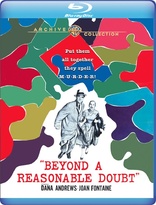
Movie rating
6.4 | / 10 |
Blu-ray rating
| Users | 0.0 | |
| Reviewer | 2.0 | |
| Overall | 2.0 |
Overview
Beyond a Reasonable Doubt (1956)
A novelist aided by his future father-in-law conspires to frame himself in the murder of a stripper as part of an effort to ban capital punishment.
Starring: Dana Andrews, Joan Fontaine, Sidney Blackmer, Arthur Franz, Philip BourneufDirector: Fritz Lang
| Film-Noir | 100% |
| Drama | 2% |
| Crime | Insignificant |
Specifications
Video
Video codec: MPEG-4 AVC
Video resolution: 1080p
Aspect ratio: 2.00:1
Original aspect ratio: 2.00:1
Audio
English: DTS-HD Master Audio 2.0 (48kHz, 24-bit)
Subtitles
English SDH
Discs
Blu-ray Disc
Single disc (1 BD)
Playback
Region A, B (C untested)
Review
Rating summary
| Movie | 1.0 | |
| Video | 4.0 | |
| Audio | 3.5 | |
| Extras | 0.5 | |
| Overall | 2.0 |
Beyond a Reasonable Doubt Blu-ray Movie Review
Stupid Law Tricks
Reviewed by Michael Reuben March 29, 2018If Fritz Lang weren't the director of Beyond a Reasonable Doubt, no one would pay it the
slightest attention. It certainly wouldn't have been dragged from the depths of Warner Brothers'
vault to be newly transferred for Blu-ray by the Warner Archive Collection. Reasonable Doubt
was the last film that the acclaimed auteur of Metropolis
,
M and Dr. Mabuse: The Gambler
directed during the American phase of his career. Shortly after completing Reasonable Doubt,
Lang left the U.S. in a huff to return to his native Germany. Whether it was the director's disgust
with Hollywood or just an unfortunate lapse in judgment, he ended up wasting his talents on an
ostensible legal thriller—I say "ostensible" for reasons that should be evident to anyone who has
seen the film—that is stupefyingly dumb.
Even in 1956, before viewers had become acclimated to fictional criminal proceedings through
TV series from Perry Mason to Law & Order, Douglas Morrow's script for Reasonable Doubt
should have raised red flags. Morrow was an Oscar-winning screenwriter (The Stratton Story),
and maybe Lang and his producer trusted his understanding of courtroom mechanics because he
held a law degree from NYU. But a degree is no substitute for actual experience, and Morrow's
screenplay depends on intricate manipulations of the legal system (not to mention character
motivations) that no filmmaker could render credibly, even one with Lang's considerable skills.

Reasonable Doubt revolves around a former newspaperman, Tom Garrett (Dana Andrews), who gave up reporting to become a novelist. His first book was a success, but now Garrett suffers from writer's block. With deadlines looming, Garrett agrees to an insane scheme by his friend and former employer, newspaper publisher Austin Spencer (Sidney Blackmer). Spencer is a confirmed opponent of the death penalty, and his nemesis is District Attorney Roy Thompson (Philip Bourneuf), who is advancing his political career with a tough stance on capital punishment and a talent for persuading juries to send defendants to the electric chair on nothing more than circumstantial evidence. Spencer is determined to prove that Thompson's practices routinely lead to the execution of innocent men. In the film's opening, he insists that Garrett join him in witnessing a state-sanctioned electrocution to inspire the former reporter to join him in his crusade.
But Spencer's plan of attack is ridiculous. Instead of devoting his considerable journalistic resources to exonerating the wrongfully convicted—a Fifties version of the Innocence Project—Spencer decides to make his point by inventing a capital case that, after the defendant is tried, convicted and sentenced, he will then reveal as a fake. In the real world, such a ruse would almost certainly get its perpetrator indicted for fraud, obstruction of justice and multiple other crimes. But Spencer manages to persuade Garrett to help concoct an elaborate fiction that will frame Garrett for an unsolved murder. They'll plant a damning array of circumstantial evidence, document what they're doing and, after Garrett has been convicted and condemned to death, publish an exposé on how D.A. Thompson railroaded an innocent man. Thompson's political career will be derailed, Garrett will have a great new plot for his novel, and Spencer will have proven the inherent unfairness of the death penalty. What could possibly go wrong?
Even if you overlook the reality that criminal convictions, once legitimately obtained, aren't so easy to undo, there are serious problems with Spencer's plan that Reasonable Doubt barely addresses. Chief among them is Garrett's recent engagement to Spencer's daughter, Susan (Joan Fontaine), whom the conspirators decide to keep in the dark about their plans. The fact that their plot requires the wedding to be indefinitely postponed—for reasons that Susan can't know—doesn't seem to trouble either her father or her fiancé. When they end up choosing the unsolved murder of a local stripper as their "test case", so that Garrett has to spend time with the victim's former colleagues as part of the frame job, and even publicly romance one of them (Barbara Nichols), neither man seems to care that Susan will be devastated. And Garrett seems perfectly comfortable with the prospect of spending months in confinement while the trial proceeds. He's even shown reclining comfortably in his cell, as if prison were a mere inconvenience rather than an unpleasant and dangerous environment where anything can happen.
Lang's direction efficiently tracks the conspirators' machinations as they plant false clues for the police, but efficient direction can't compensate for the scenario's inherent absurdity. The actors are overwhelmed by their characters' fundamental lack of credibility—Fontaine, an Oscar winner for Suspicion, is particularly ill-served—while the plot speeds toward a turn that you can see coming from a mile away, as the hoax goes awry, and Garrett is faced with the prospect of being sent to the chair by the very evidence he and Spencer manufactured. I won't spoil the movie by revealing what happens next, but suffice it to say that Reasonable Doubt's resolution up-ends everything that has gone before. I defy anyone to make sense of the time line. In the film's rushed conclusion, with Lang offering his own twisted version of the familiar scene where a last-minute phone call may or may not arrive to determine a condemned man's fate, it has long since become apparent that it's the director who's phoning it in.
Beyond a Reasonable Doubt Blu-ray Movie, Video Quality 
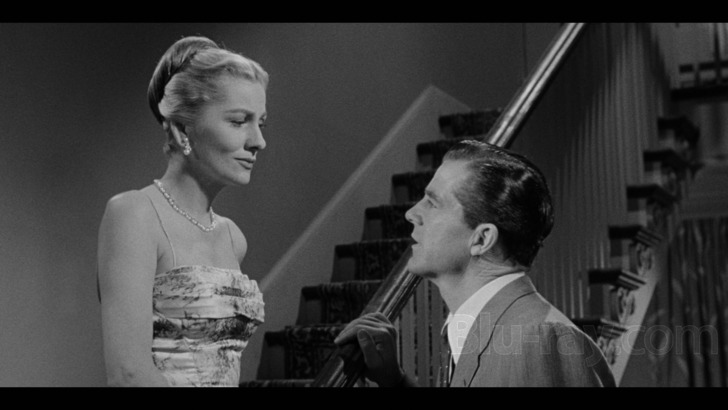
Beyond a Reasonable Doubt is being released in tandem with another of Fritz Lang's films for
RKO Pictures, While the City
Sleeps, and like that film, it was photographed in a process that
was advertised as "RKO-Scope", which was RKO Pictures' branding of a format known as
Superscope. The cinematographer was William Snyder (Creature from the Black Lagoon). For
an explanation of the Superscope format, please see the review of While the City Sleeps. As with
that film, the Warner Archive Collection has formatted its 1080p, AVC-encoded Blu-ray of
Reasonable Doubt in its originally intended 2.00:1 aspect ratio. The 1080p master was derived
from a fine-grain master positive that dates back to the film's original release, which was
scanned at 2K by Warner's Motion Picture Imaging facility, followed by extensive color
correction and WAC's usual thorough cleanup to eliminate scratches, dust marks and other
imperfections. The resulting image may not rank with WAC's best black-and-white releases, but
it is noticeably superior to that of City Sleeps, with better sharpness and detail. As
with City Sleeps, those qualities vary between closeups and medium shots, which here are
consistently quite good, and long shots like those in the courtroom, which tend to be soft and less
distinct. Here, too, the blacks are solid, the shades of gray are finely delineated, and the film's
grain pattern has been naturally rendered and finely resolved. Once again, one is left to speculate
whether a better result might have been possible with either a 4K scan from negative or the
creation of a new fine-grain using contemporary stocks. But if both those options were
prohibitively expensive for the superior City Sleeps, they are certainly unlikely to be applied to a
clunker like Reasonable Doubt.
Reasonable Doubt has been placed on a BD-25, but since the film is only 80 minutes long and
has no extras other than a trailer, WAC has still managed to achieve its usual high average bitrate
of just under 35 Mbps.
Beyond a Reasonable Doubt Blu-ray Movie, Audio Quality 
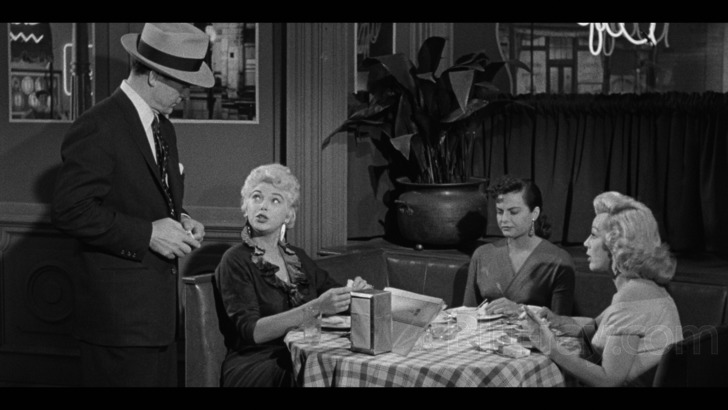
In its waning years, RKO Pictures did not preserve magnetic sound masters. The mono soundtrack for Beyond a Reasonable Doubt has been taken from an optical track, cleaned of clicks, pops and age-related distortion, and encoded on Blu-ray in lossless DTS-HD MA 2.0. It's a serviceable track, with consistently intelligible dialogue and essential sound effects. The score by Herschel Burke Gilbert (who had previously worked with Lang on While the City Sleeps) does what it can to add suspense to the increasingly nutty proceedings.
Beyond a Reasonable Doubt Blu-ray Movie, Special Features and Extras 
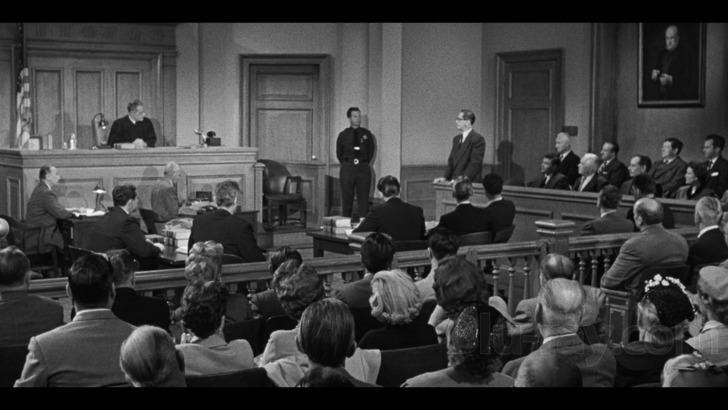
The only extra is the film's trailer (1080p; 2.00:1; 2:43), which has been remastered in 1080p. WAC's 2011 DVD of Reasonable Doubt was similarly bare.
Beyond a Reasonable Doubt Blu-ray Movie, Overall Score and Recommendation 
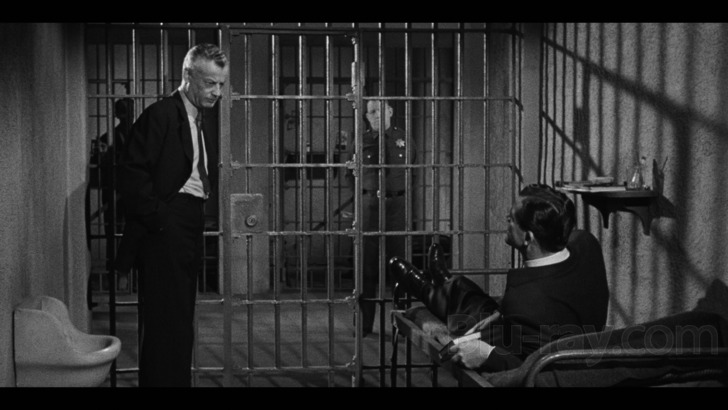
Fritz Lang's 1936 thriller Fury, starring Spencer Tracy, is a genuine classic that
effectively addresses many of the themes teased and then botched by Reasonable Doubt. Unfortunately, the
negative for the earlier film has been lost, and I'm advised that the surviving elements are in such poor shape that
a Blu-ray release is unlikely. Instead, WAC has given us two of Lang's least noteworthy films.
Although the Blu-ray rendition is capable, I recommend skipping Reasonable Doubt, unless
you're curious to experience just how low a great filmmaker can sink.
EDIT (on Oct. 21, 2021): What a difference a few years of technological progress can make! Using the latest developments in scanning and
software, the wizards at MPI have successfully extracted -- from multiple sources -- a presentation of "Fury" that I am told is sufficient to satisfy WAC's
high standards. The release is scheduled for Nov. 9, 2021.
Similar titles
Similar titles you might also like

Kansas City Confidential
1952

The Dark Corner
1946

The File on Thelma Jordon
1950

The Man Who Wasn't There
2001

Kiss Tomorrow Goodbye
1950

Sudden Fear
1952

The Crooked Web
1955

Angels with Dirty Faces
Warner Archive Collection
1938

Cast a Dark Shadow
1955

The Postman Always Rings Twice
1946

The Letter
Warner Archive Collection
1940

99 River Street
1953

The Grifters
1990

The Wrong Man
Warner Archive Collection
1956

Croupier
1998

The Dark Mirror
1946

Cry Danger
1951

The Chase
Special Edition
1946

My Name Is Julia Ross
1945

Straight Time
Warner Archive Collection
1978